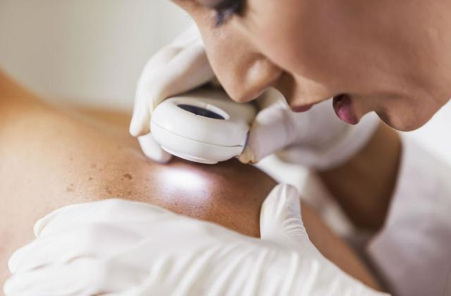The machine was able to more accurately diagnose malignant melanoma and benign nevi.
The dermatologists accurately detected an average of 86.6 percent of melanomas, compared to the CNN's 95 percent accuracy.
MACHINE MAY BE BETTER than man when it comes to detecting skin cancer in patients.
For the first time, researchers have shown that artificial intelligence known as deep learning convolutional neural network (CNN) is better than experienced dermatologists at detecting skin cancer, a study published recently in the Annals of Oncology found.
According to a press release, CNN is an artificial neural network "inspired by the biological processes at work when nerve cells (neurons) in the brain are connected to each other and respond to what the eye sees." The CNN is a fast learner, able to teach itself after seeing images and improving its performance based on what it has learned. This process is called machine learning.
Professor Holger Haenssle, author of the study and senior managing physician of the Department of Dermatology at the University of Heidelberg in Germany, compared CNN to a child's brain, explaining in the press release that the technology improved with each training session.
In this study, researchers trained the CNN to identify skin cancer by showing it more than 100,000 images of malignant melanomas, the deadliest form of skin cancer, as well as nevi, benign moles, and indicating the diagnosis for each image.
The researchers from Germany, France and the United States then compared CNN's performance to the performance of the dermatologists and discovered that CNN missed fewer melanomas and misdiagnosed nevi as malignant less often than the dermatologists. The dermatologists accurately detected an average of 86.6 percent of melanomas and accurately detected an average of 71.3 percent of nevi. However, the CNN correctly identified 95 percent of melanomas.
Later in the study, the dermatologists were given clinical information about the patients, including sex, age and location of the lesion. Their success rate of accurately diagnosing malignant melanomas increased to 88.9 percent and to 75.7 percent for accurately detecting benign nevi. However, the CNN still had a higher success rate even without this background information.
"When dermatologists received more clinical information and images at level II, their diagnostic performance improved. However, the CNN, which was still working solely from the dermoscopic images with no additional clinical information, continued to outperform the physicians' diagnostic abilities," Haenssle said in the press release. "These findings show that deep learning convolutional neural networks are capable of outperforming dermatologists, including extensively trained experts, in the task of detecting melanomas."
According to the Skin Cancer Foundation, melanoma kills an estimated 10,130 people in the United States per year, and incidences of melanoma are rising.
While Haenssle and his team do not envision CNN will replace dermatologists in
skin cancer screening, they do believe it can be used as an additional aid.
"This CNN may serve physicians involved in skin cancer screening as an aid in their decision whether to biopsy a lesion or not," Haenssle said. "Most dermatologists already use digital dermoscopy systems to image and store lesions for documentation and follow-up. The CNN can then easily and rapidly evaluate the stored image for an 'expert opinion' on the probability of melanoma."
